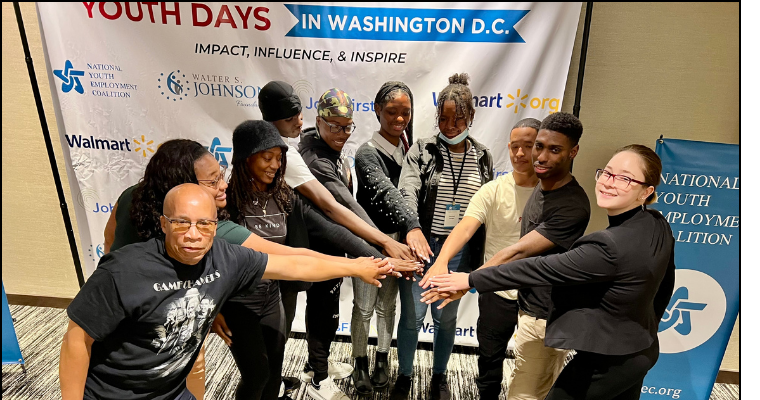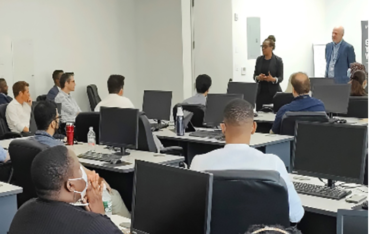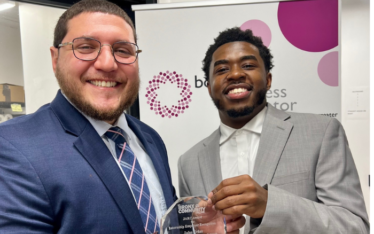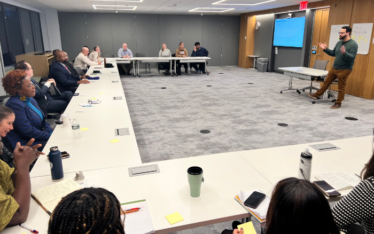JobsFirstNYC rallies in D.C. alongside young adults and practitioners from our partner organizations to advocate for policies to improve education, job training, and employment for youth across the country.
According to the July 2023 JobsFirstNYC data brief, there are 138,029 young people aged 16–24 who are out of school and out of work in New York City, and approximately 5 million nationally. These young adults face countless barriers as they seek opportunities for education and employment to enter into meaningful, sustaining careers. More than ever, it is necessary to advocate for investment in young adult education and workforce opportunities and to center youth voice in the policies and practices that aim to serve them. These two objectives were addressed earlier this month at the first annual Youth Days in D.C.
In September 2023, JobsFirstNYC, alongside young adults and chaperones from our partner organizations Phipps Neighborhoods, Marcy Labs, the Brownsville Community Justice Center, and Green City Force participated in the first annual Youth Days in DC. The event, co-designed by JobsFirstNYC’s policy committee and the National Youth Employment Coalition, aimed to foster education and empowerment for both young people and practitioners from across the country. It could not have come at a more critical time, as talks of cutting funding for youth employment services take place in the House.
For three days, young adults and workforce development practitioners came together to learn about and discuss topics in youth employment policy and practice, including using research and data for impact, dispelling falsehoods around opportunity youth, job opportunities in the growing semiconductor industry and effective practices for building apprenticeship programs. The conference culminated in a day of meetings with U.S Congress Members. Participating teams shared their first-hand experiences and advocated for important policy changes including the protection and expansion of funding for youth apprenticeship programs, specifically in growing industries, and the reauthorization of the Workforce Innovation and Opportunity Act (WIOA).
For many of the young participants, the highlights of the conference were meeting other young adults from across the country, and speaking to policymakers on behalf of their communities. They were eager to share their experiences with state leaders, and advocate for the importance of paid employment opportunities for young people. This sentiment was echoed by the practitioners in attendance.
Jamel Gettes, an intern at BCJC, wanted his legislators to know what the education and work opportunities at Brownsville Community Justice Center [BCJC], a multi-faceted agency that invests in local youth in Brownsville, New York, mean to him and his peers: “It’s reliable. I know it’s a place I can go to and there’s always [a job] open. When any young person in the community is having a rough time or knows they need to make some money, they can come back to BCJC to get employment and community. It means a lot to have a neutral space where my friends and I can come together.”
Destiny Hamilton, Urban Planner at BCJC, explained her desire for more investment in apprenticeships and other paid work opportunities for young adults in her community. “Young people come in [to BCJC] interested in doing apprenticeships, in tattoos or music or cosmetology for example, and we don’t know who to connect them to.”
Additionally, Destiny explained, many of the work grants BCJC offers have particular stipulations—for instance, youth need to have been justice-involved to qualify for certain paid opportunities. She wants to see more robust funding for employment opportunities for all the young people who come into the center looking for jobs in their communities.
Willie Thomas, Program Director of Community and Public Safety at Phipps Neighborhood, echoed Destiny’s sentiments about the necessity of providing jobs with livable wages to young people. “The young folks we work with get stipends,” he explained in an interview. “Most of the time, those stipends don’t equate to minimum wage. They’re making something like $200 a week—which is certainly not enough to put a roof over their head, as many of them need to do. You just can’t do that. There has to be a cost-of-living adjustment to give young people a livable wage.”
The JobsFirstNYC team and partners left D.C. feeling proud of the case they presented to the policymakers and ready for the work ahead to support young adults and their communities on their path to economic mobility. Ashley Tucker, Software Engineering Fellow at the Marcy Lab School, shared how it felt to meet with legislators for the first time.
“Speaking in spaces with high powered individuals can be intimidating, but the NYEC and other attendees reassured how important it is to be a voice for these opportunities and our community growth programs. What I learned the most from this experience is how much value my voice and my unique perspective have on the world around me. Being able to tell my story, specifically my experience at the Marcy Lab, made me feel empowered in ways I haven’t before.”





